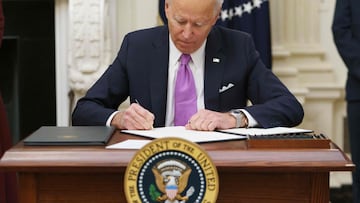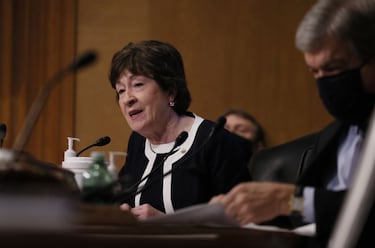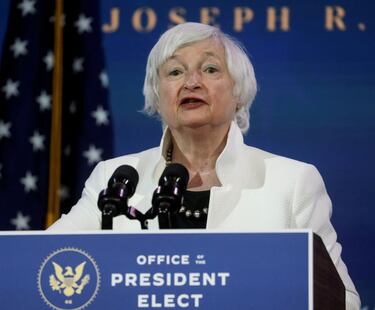Third stimulus check: will Congress accept a new payment before February?
There is a proposed $1.9tn coronavirus economic relief package included in US President Joe Biden's plans, and doubts remain over another round of payments.

After taking office, US President Joe Biden has been quick to get to work, as he promised he would, on various elements that he believes are crucial to returning the country to a period of wealth, equality and global influence. One of the most urgent of these was dealing with the coronavirus pandemic and the economic devastation brought upon many millions of Americans.
Part of his relief package was to include a third stimulus check, this time for up to $1,400, but many are wondering if they are likely to receive a payment in the coming days. Senate push-back could make that more difficult than Biden had hoped, and a new payment will not arrive before February, although the existing distribution continues.
President Joe Biden will escalate appeals for Congress to back his top priority, $1.9 trillion in pandemic relief https://t.co/lU543ZNf4E
— Bloomberg Politics (@bpolitics) January 25, 2021
Biden's stimulus check promise
As part of the new president's $1.9tn American Rescue Plan (ARP) announced earlier this month, the $1,400 maximum payment represents the difference between the $600 second stimulus check included in December’s $900bn covid-19 aid package and the $2,000 figure Democrats unsuccessfully sought to raise this to.
"We will finish the job of getting a total of $2,000 in cash relief to people who need it the most," Biden said as part of his ongoing commitment to his citizens. "The $600 already appropriated is simply not enough if you have to choose between paying rent and putting food on the table. Even for those who have kept their jobs, these checks are really important.”
- Dominion Systems sues Trump lawyer Giuliani for $1.3 billion
- What is Joe Biden changing in the Oval Office makeover?
- Biden's new proposal could be worth thousands to struggling families
- IRS second stimulus check tracker tool
- Biden doubles minimum wage for federal workers
Pelosi looking to fast-track the House work
Speaker of the House, Nancy Pelosi, is trying to push through the Biden plan as quickly as possible, with committees aiming to vote on it this week and have it ready for a full House vote early next week. This is expected to pass.
But to gain complete approval Biden needs wider support in the Senate and Politico have reported that several senators are pushing back on his aid package, arguing that there is too much being handed out to already wealthy Americans.
Bipartisan group express concern over stimulus package
President Biden's administration held a call on Sunday with a bipartisan group pf senators. That group of 16 was being led by Republican Susan Collins of Maine and Democrat Joe Manchin of West Virginia, and are said to have made it clear that they were not comfortable with a further check up to the value of $1,400 being sent out to all Americans and that funds should instead be targeted to low-income families and individuals.
They also preferred the money to be invested in an improved vaccine distribution to help drive down the overall rate of infection across the country in an effort to find a way out of the pandemic.

"It's hard for me to see when we just passed $900 billion of assistance why we would have a package that big," Sen. Collins said late last week. "Maybe a couple of months from now, the needs will be evident and we will need to do something significant, but I'm not seeing it right now."
"This isn't Monopoly money," was an additional comment reported to have been made by Maine Sen. Angus King, also on the call.
Democrats could opt to go it alone - but bipartisan stimulus package may in fact be quicker
That said, Janet Yellen, Biden’s pick for Treasury secretary, has urged US lawmakers to "act big" on the next coronavirus relief package and, given that the Democrats now have control of both the House of Representatives and the Senate, they could also look to go it alone on larger relief legislation.
Their wafer-thin advantage in the Senate - the chamber is a 50-50 split, with Democratic Vice-President Kamala Harris given a tie-breaking vote - does not give them the filibuster-proof 60 votes they normally need to ensure legislation advances beyond the debate stage in the upper house, but in this case they can get round that by using a process called 'budget reconciliation', which only requires a simple majority of 51 for a bill to get through.

However, Phillips feels following such a strategy could end up actually being a more drawn-out process than negotiating a smaller bill supported by enough senators from both sides of the floor. "There’s a lot of procedural stuff that goes into [budget reconciliation] that could make it take longer […]," he said.
"If they go the bipartisan route and it looks like maybe they can get 60 votes in the Senate for that, then that’s maybe a little bit quicker," he added, noting that there is no guarantee of unanimous support for a larger package from all 50 Democratic senators.
And with thoughts on the upcoming impeachment trial Phillips was measured with his timescales: "Probably under any scenario I think we get something done by March."
Stimulus squabble - President Biden faces pushback on $1.9 trillion #COVID19 relief bill.
— Julia Chatterley (@jchatterleyCNN) January 25, 2021
"Normal people are deficit hawks by nature, but not in the middle of a #crisis," says @ChristineRomans, "This is not the time to be worried about the Chinese owning our debt." pic.twitter.com/I3mKVdIZ07
Stimulus check would likely arrive around a week after being approved
Once a relief bill featuring a third stimulus check is passed by legislators and signed into law by the president, the IRS can now be expected to get the majority of eligible Americans their payment in a matter of days.
Related stories
Although the body took just over two weeks to begin sending out the first round of stimulus checks after their approval in March, most direct-deposit recipients had received December's second check within about a week.
Stimulus check and US politics: live news
You can follow the latest news on US politics and the proposed third stimulus check with our dedicated live blog.

